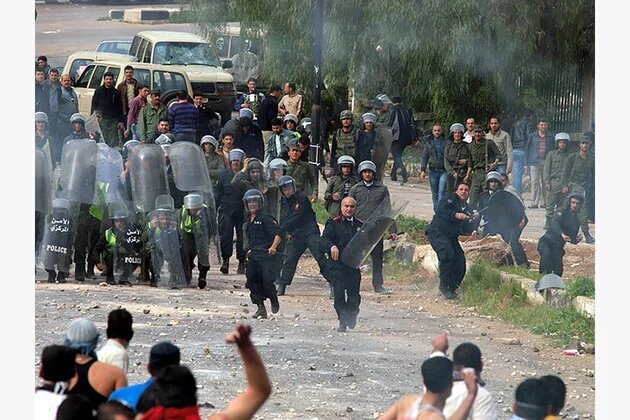
"Is it possible that [the Islamic State group], and other groups were created because of us?" asked Ziad, a Syrian in a documentary about the country's five-year war, Our Terrible Country. This triggered many similar questions during last week's panel discussion I participated in at the London School of Economics.
I was surprised that many people - all foreigners - wanted to know whether Syrians felt guilty about the revolution which has led to five years of fighting in Syria and as many as 470,000 people killed. Some of them even quoted their Syrian friends, who expressed uncertainty and regret about whether starting the Syrian revolution was worth the price the country is now paying.
I was taken by surprise because this was the first time since the beginning of the revolution - this week marking the fifth anniversary of its start - that I have been asked whether I feel guilty about the uprising against Bashar al-Assad.
Oh Daraa!
Many Syrians carry with them mixed feelings about starting the revolution, especially those who lost loved ones in the war. Even the famous chant in solidarity with the city that started the uprising against the regime, has changed. "Ya Daraa hina maaki la almout" [oh Daraa, we stand by you until the end] has become "Ya Daraa sho kan bidna bi ha al saraa"[oh Daraa, what were we thinking to start this nightmare].
Although the latter chant was first used as a joke to "blame" Daraa city for starting protests in 2011, which began the wider uprising against Assad, for some the message was, in part, a serious consideration.
Feelings of guilt about the war are similar survivors' syndrome after people experience traumatic events while those around them did not survive. There are two main types of guilt; one is regret that they failed to do more and the other is about what they did do. These feelings vary in reasons and intensity, although the two sometimes overlap.
Some people feel guilty for starting the revolution and consider it the main factor which led to the catastrophic situation we face today in Syria. Something you will often hear from people who share this feeling is that "Syria could still be the same if we would have accepted the situation as it is."
Nour, a student from Daraa, thinks this way: "I think every day about what my life in Syria would be like if we didn't start the revolution. I am not blaming the revolution but we lost everything we once had. Two of my brothers are dead, our home is destroyed and we all live in a tent in Jordan now."
Others feel guilty about not doing more to ensure that the goals of the revolution were achieved. These feelings vary from allowing the revolution to become militarised to allowing it to be hijacked by opportunists and extremists.
Reem, a non-violence activist from Damascus, believes that things would have been better if the Syrian revolution continued peacefully. "I keep discussing with my friends the things that could have been done differently to save our peaceful revolution. I know that picking up arms was not an option and many were forced to defend themselves, but I still feel that we could have done more to stop the revolution from becoming an armed conflict."
Not doing enough to stop extremists from hijacking the revolution is what makes Raed feel most guilty: "I regret not doing enough to stop those who were trying to use it for their own benefits. We were naive to think that we can win the revolution by only opposing the regime. Those who hijacked the revolution for their own agendas were as harmful.
Survivors' syndrome
In this context, Syrians who survived the assault by Bashar al-Assad's regime have started to blame themselves. This is the pain felt by many survivors of violent incidents, where victims tend to blame themselves instead of the perpetrators. Syrians only asked for their basic rights when they piled onto the streets to take part in peaceful protests. The Syrian regime's excessive use of force against demonstrators led to a vicious circle of violence that has caused the tragic situation in Syria today.
Furthermore, the Assad regime's deliberately released thousands of extremists from prisons while continuing to kill and arrest peaceful activists. The regime also allowed and facilitated the creation of the Islamic State group, al-Nusra Front and other extremist groups, so it became a case of choosing the lesser evil.
Acknowledging these feelings of guilt doesn't mean ignoring the mistakes committed by activists, opposition groups, and their allies. However, these mistakes were not the reasons that Syrians face such a horrendous situation today.
Their emotions should be understood as a symptom of the traumatic violence they have endured and it doesn't change the fact that the Assad regime and his backers are the real ones to blame for the bloody price Syrians are now paying for wanting a better future.
"I don't feel guilty because I know that the revolt against a regime that is willing to kill as many as it takes to stay in power, is the right thing to do." That is my answer.